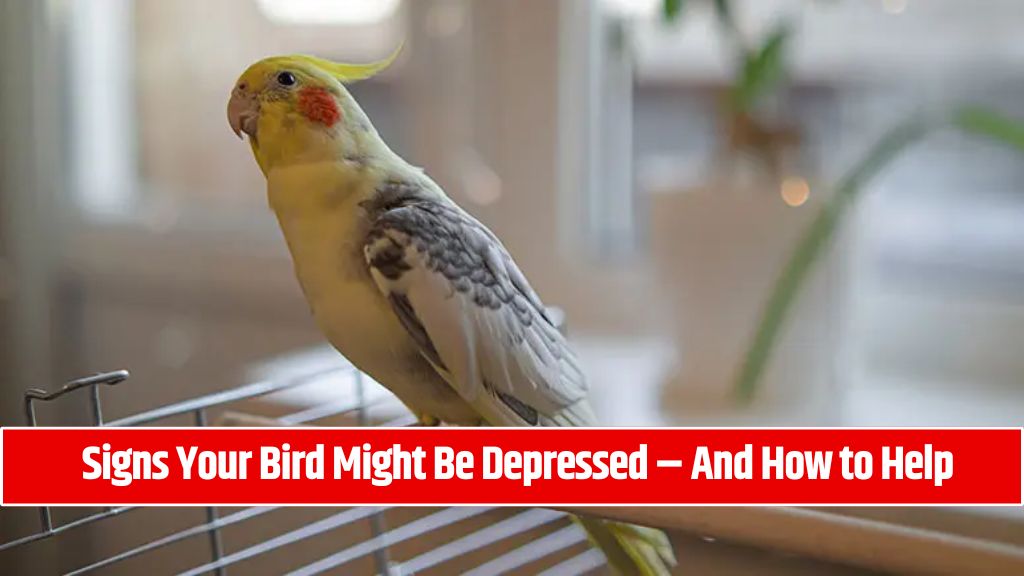Birds, like humans, can experience depression, which, if left untreated, can lead to self-destructive behaviors, a weakened immune system, and other serious health issues. If you suspect that your pet bird is feeling low, it’s essential to observe its behavior closely and make the necessary changes to its environment and daily routine.
Here are some common signs of depression in birds and what you can do to help your feathered friend feel happy again.
1. Loss of Appetite
One of the first and most concerning signs of depression in birds is a decrease in appetite.
What to Watch For:
- Eating significantly less than usual
- Avoiding favorite foods
- Sudden weight loss
Birds have fast metabolisms, so even a short period of food refusal can be dangerous. If your bird’s food intake changes for more than two days, consult an avian veterinarian immediately to rule out health problems.
2. Sudden Personality Changes
A usually friendly and social bird may become aggressive, withdrawn, or irritable when experiencing depression.
Signs of Personality Shifts:
- Increased aggression or biting
- Loss of interest in interacting with humans or toys
- Becoming quieter or more inactive
While some changes in behavior are natural, especially during hormonal shifts, persistent mood swings should not be ignored. If no medical issues are found, consider environmental factors that may be causing stress, such as lack of attention, boredom, or loneliness.
3. Feather Plucking or Self-Mutilation
Feather plucking is a common but serious sign of emotional distress in birds.
What Causes Feather Plucking?
- Boredom or loneliness from lack of stimulation
- Lack of social interaction with owners or other birds
- Stress or environmental discomfort
How to Help:
- Increase the amount of time spent with your bird
- Provide more toys and mental enrichment
- Ensure a calm and stable environment
If your bird is plucking feathers excessively, visit a vet to rule out any medical conditions before assuming it’s due to stress or depression.
4. Unusual Vocalization Changes
Birds have unique vocalization patterns, and a noticeable shift in how often or how loudly they vocalize can indicate distress.
Signs to Look For:
- Excessive screaming (out of boredom or frustration)
- Reduced vocalization (lack of energy or interest)
- Change in tone or frequency of sounds
If your bird suddenly starts screaming more than usual, it may be craving attention and interaction. On the other hand, if a normally talkative bird becomes silent, it could be feeling sad or unwell.
5. Stress Bars on Feathers
Stress bars are visible lines or grooves on feathers that indicate poor feather development due to stress or illness.
Possible Causes of Stress Bars:
- Poor diet or nutritional deficiencies
- Anxiety from changes in environment
- Inadequate socialization or lack of mental stimulation
If you notice stress bars, evaluate your bird’s diet, daily routine, and living conditions to see if any improvements can be made.
How to Help a Depressed Bird
If your bird is showing one or more signs of depression, taking these steps can improve its emotional well-being:
Spend More Quality Time Together
Birds are social creatures that need daily interaction. Try to talk, play, or train with your bird every day to strengthen your bond.
Provide Mental Stimulation
- Boredom is a major cause of depression in birds. Offer:
- A variety of toys (puzzles, mirrors, chewable toys)
- Foraging activities to keep them engaged
- Music or bird sounds to provide background stimulation
Improve the Environment
Make sure your bird’s cage and surroundings are clean, safe, and enriched with perches, swings, and hiding spots.
Ensure a Healthy Diet
A nutritious diet with a mix of fresh fruits, vegetables, seeds, and pellets is crucial for both physical and emotional well-being.
Rule Out Medical Issues
If your bird’s behavior changes suddenly, consult a vet to check for underlying health problems before assuming it’s depression.
Depression in birds is a serious issue that can affect their health and happiness. By observing changes in eating habits, personality, vocalization, feather condition, and activity levels, you can determine if your bird is feeling low.
Providing companionship, mental stimulation, and a comfortable environment can help your feathered friend regain its joy. If symptoms persist, seek guidance from an avian veterinarian to ensure your bird gets the best care possible.
FAQ’s
Can birds get depressed?
Yes, birds can experience depression, which can lead to behavioral issues like feather plucking, appetite loss, and excessive screaming.
What are the signs of depression in birds?
Common signs include appetite loss, sudden personality changes, excessive vocalization, feather plucking, and stress bars on feathers.
How can I help my depressed bird?
Spend more time with your bird, provide mental stimulation, improve its environment, and ensure a healthy diet. If symptoms persist, consult a vet.
Why is my bird plucking its feathers?
Feather plucking can be a sign of boredom, stress, or lack of social interaction. Rule out medical issues before addressing behavioral causes.
Should I take my bird to the vet if it seems depressed?
Yes, if your bird shows prolonged signs of depression, a vet can check for underlying health conditions and recommend appropriate care.















